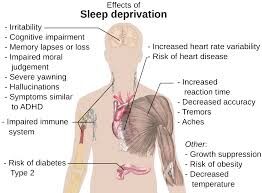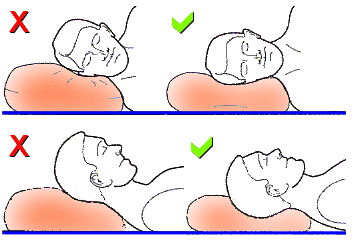Insomnia
Lack of sleep can have many negative outcomes on a person's health.

If you have problems with sleep try simple lifestyle changes before resorting to medication. The concept of good sleep habits is often referred to as 'sleep hygiene'.
Simple lifestyle changes to for a good nights rest:
Blue light
Short waves from blue light ( eg cellphone, tablet, alarm clock) can interfere with melatonin. Your body interprets this as 'daytime' and this interferes with melatonin production which is needed for sleep. Cover any blue lights that you cannot turn off. Otherwise turn off your PC, tablet, cellphone or TV at an hour before you go to sleep.
Pillows

Make sure your pillow supports your neck at night in a neutral position. If you have backpain at night, consider placing a soft pillow between your legs. When sleeping on your side, try to align your nose with the centre of your body. Avoid sleeping on your stomach as your neck maybe twisted into an uncomfortable position to accommodate this position. Do not strain your neck at night before sleeping ie: reading in an uncomfortable position at night for hours before bedtime.
Allergies
Allergies can result in sneezing, sniffling or itchiness which disrupts sleep. Ensure that your allergies are well controlled. Speak to your doctor for appropriate treatment plan. Consider sealing your mattress, pillows and duvet covers with anti-allergy covers. Avoid bedspread and padded headboards. Wash all bedding regular, preferably in hot water and expose to regularly to sunlight.
Create a calm bedroom for rest and relaxation
Avoid catching up with admin or emails in your bedroom. Do not watch TV in the bedroom. Do not study in the bedroom. Keep the colours in your bedroom neutral with soft furnishings. Ensure the room temperature is comfortable to fall asleep ( usually about 22 degrees celsius). Keep the ligthing in the bedroom dimmed.
Keep a routine
Try to go to bed ad awake at the same time everyday including weekends. The helps establish a healthy sleep wake cycle.
Daytime naps
Falling asleep within 8 hours of your bedtime can negatively impact your sleep. If you have to nap in the daytime, keep it short to less than 20 minutes which is just enough to rejuvenate you.
Caffeine
Avoid caffeine after midday Remember caffeine is also found in cooldrinks, chocolates and certain medications. It can take up to 8 hours for the effects of caffeine to wear out in your body.
Exercise
Regular exercise promotes good sleep. However time your exercise routine. A recent study shows that exercise in the morning may help with insomnia. Rigorous exercise in the evening may make you feel more energized and keep you awake. Rather opt for gentle evening exercise such as yoga or tai chi.
Night time snacks
Going to bed hungry is not conducive to a good nights rest. Having a heavy meal late in the evening may keep you awake. Certain food can help you sleep. Tryptophan is a substance found in milk, bananas, oats and honey. Some research shows that tryptophan is a natural sedative. Have your last snack at least an hour before bedtime.
Alcohol
Alcohol maybe seen as sedating. However it may help you fall asleep but you may have a restless nights rest.
Fluids
Try to limit your fluid intake after 8pm. Waking up to empty a full bladder can be disruptive on your natural sleep cycles at night.
Smoking
The effects of nicotine is similar to that of caffeine. You may perceive 'a cigarette' as calming before bed, it actually has he opposite effect on your body.
Pets
Pets can shed substances that can trigger of allergies. The constant motion of the pet may also interrupt sleep.
Night time sleep ritual
Develop a ritual before bed that is calming and soothing to prepare your body and mind for a good nights rest. Consider reading ( not off an electronic device), meditation, aromatherapy or a hot bath.
Medication
Medications prescribed for insomnia is effective for that purpose but has side effects. Most of these pills can be addictive. Rather, opt for lifestyle changes before resorting to medication. Speak to your doctor to prescribe a safer drug if needed.
Medical conditions
Insomnia maybe a symptom of another medical condition that needs to be managed appropriately. Insomnia maybe a symptom of diabetes, asthma, depression, anxiety, arthritis or thyroid diseases. Also consider that the insomnia maybe a side effect of medications you are currently using.
